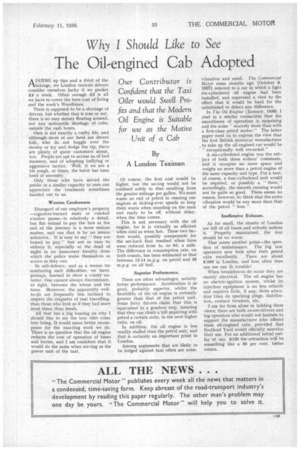W hy I Should Like to See
Page 99

If you've noticed an error in this article please click here to report it so we can fix it.
The Oil-engined Cab Adopted
Our Contributor is Confident that the Taxi Oiler would Swell Profits and that the Modern 'Oil Engine is Suitable for use as the Motive Unit of a Cab
By A London Taximan ADYING up tips and a third of the takings, we London taxicab drivers consider ourselves lucky if we pocket £4 a week. Often enough £3 is all we have to cover the bare cost of living and the week's Woodbines.
There is supposed to be a shortage of drivers, but whether that is true or not, there is no easy money floating around, nor any noticeable shortage of cabs, outside the rush hours.
Ours is not exactly a cushy life, and although most of our fares are decent folk, who do not haggle over the money or try and dodge the tip, there are plenty of queer customers about, too. People are apt to accuse us of bad manners, and of adopting bullying or aggressive tactics. Well, if we are a bit rough, at times, the habit has been bred of necessity.
Only those who have served the public in a similar capacity to ours can appreciate the treatment sometimes handed out to us.
Wanton Carelessness Disregard of our employer's property —cigarette-burned mats or cracked window panes—is relatively a detail, but flat refusal to pay the fare at the end of the journey is a more serious matter, and one that is by no means unknown. It is easy to say " they are bound to pay," but not so easy to enforce it, especially at the dead of night in an unsavoury locality . from which the police make themselves as scarce as they can.
In self-defence, and as a means for combating such difficulties, we have, perhaps, learned to show a crusty exterior. One cannot always discriminate, at sight, between the wheat and the tares. Moreover, the apparently wellto-do are frequently less inclined to respect the etiquette of taxi travelling, than those who look as if they had more meal times than meals.
All that has a big bearing on why I should like to see the taxi oiler come into being. It would mean better recompense for the exacting work we do. There is no question that the oil engine reduces the cost of operation of buses and lorries, and I am 'confident that it would do the same when serving as the power unit of the taxi. Of course, the first cost would be higher, but the saving would not be confined solely to that resulting from the greater mileage per gallon. We must waste no end of petrol in running our engines at ticking-over speeds to keep them warm when standing on the rank and ready to be off, without delay, when the time comes.
This is not necessary with the oil engine, for it is virtually as efficient when cold as when hot. These two factors would, possibly compensate for the set-back that resulted when fares were reduced from ls. to 9d. a mile. The difference in consumption rate, on both counts, has been estimated as that between 12-14 m.p.g. on petrol and 36 m.p.g. on oil fuel.
Superior Performance.
There are other advantages, notably better performance. Acceleration is as good, probably superior, whilst the flexibility of the oil engine is certainly greater than that of the petrol unit. Some lorry drivers claim that this is equivalent to a gearbox step, meaning that they can climb a hill cequiring with petrol a certain ratio, in the next higher ratio, on oil.
In addition, the oil engine is less readily stalled than the petrol unit, and that is certainly an important point in London.
Among arguments that are likely to be lodged against taxi oilers are noise, vibration and smell. The Commercial Motor some months ago (October 8, 1937) referred to a car in which a light six-cylindered oil engine had been installed, and expressed a view to the effect that it would be hard for the uninitiated to detect any difference.
In The Oil Engine ( January, 1938) I read in a similar connection that the smoothness of operation is surprising and the noise" scarcely more than with a first-class petrol motor." The latter paper went on to express the view that the first British motorcar manufacturer , to take up the oil-engined car would be " exceptionally well rewarded."
A six-cylindered engine was the subject of both these writers' comments, and it occupies no more space and weighs no more than a petrol engine of the same capacity and type. For a taxi, of course, a four-cylindered unit would be required, or possibly a " three," accordingly, the smooth running would not be quite so good. There seems no reason, however, to think that the extra vibration would be any more than that of the petrol " four."
Inoffensive Exhaust.
As for smell, the streets of London are full of oil buses and nobody notices it. Properly maintained, the taxi should be no worse.
That raises another point—the question of maintenance. The big taxi operators now look after their petrol cabs excellently. There are about 8,000 in London, and how often does one see one in trouble?
When breakdowns do occur they are mainly electrical. The oil engine has no electric-ignition system, whilst its injection equipment is no less reliable and requires little, if any, more attention than do sparking plugs, distributors, contact breakers, etc.
I am far from alone in holding these views; there are both owner-drivers and big operators who would not hesitate to support the manufacturer who offered them oil-engined cabs, provided that Scotland Yard would officially sanctiou their use. For an additional initial outlay of, say, £120 the attraction will be something like a 50 per cent, better return.




























































































































































